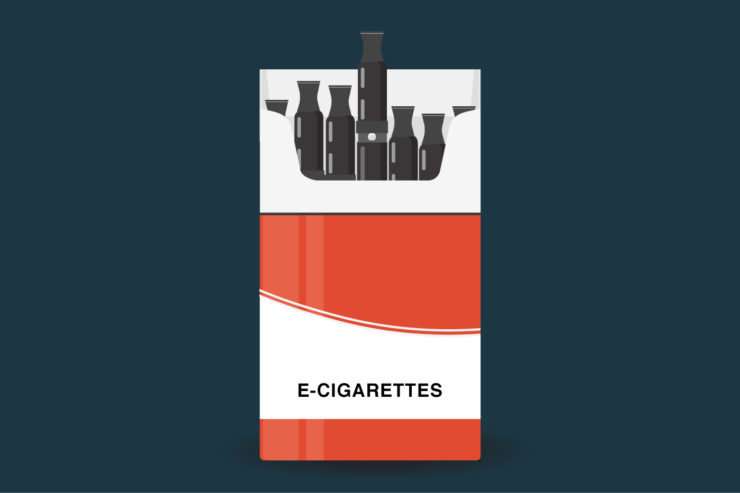Credit: Northeastern University
E-cigarettes have been marketed as the new, safer way to smoke. But scientists say they don't know enough about the long-term health hazards. E-cigarettes may not be as safe as we've been led to believe.
In September, Food and Drug Administration commissioner Scott Gottlieb sounded the alarm about what he called an "epidemic" of underage e-cigarette use. Over the past several months, the FDA has issued warnings and citations to more than 1,300 stores for selling e-cigarettes to underage users. The agency also sent letters to five major e-cigarette companies, which make up 97 percent of the industry, demanding that they create plans to ensure their products don't fall into young hands.
E-cigarettes were invented in the early 2000s as a way to help smokers get their nicotine fix without the well-established hazards of inhaling burning tobacco products. Ideally, smokers could even use e-cigarettes as a stepping stone to kicking the habit entirely.
E-cigarettes were brought under the FDA's jurisdiction in 2016. Not wanting to stand in the way of this potentially life-saving new technology, the agency allowed the sale of e-cigarettes, with the caveat that companies complete a lengthy approval process by Aug. 8, 2022.
But the FDA failed to predict the explosion of teen use. With flavors like mango, cherry crush, and blue raspberry cotton candy, e-cigarettes have caught on with teens and young people. In 2017, over 2 million middle- and high-school students were vaping.
While the FDA is primarily concerned with the effects of an addictive chemical such as nicotine on developing teenage brains, Northeastern researcher Jessica Oakes points out that in the rush to replace combustible cigarettes with e-cigarettes, scientists haven't had a chance to determine if e-cigarettes are safe in the first place.
"The market is changing so quickly," said Oakes, an assistant professor in Northeastern's bioengineering department. "We're having a hard time keeping up."
Earlier this year, Oakes and fellow bioengineering assistant professor Chiara Bellini received an FDA-funded grant through the National Institute of Health to study the effects of e-cigarettes on the heart and lungs.
Most e-cigarettes have a refillable or replaceable cartridge, which contains a mixture of fairly common food additives (glycerine and propylene glycol), nicotine, water, and some sort of flavoring. When the cartridge is heated, that mixture is vaporized for the user to inhale.
Credit: Hannah Moore / News@Northeastern
But as the contents are heated, Oakes said, they can be transformed into chemicals called aldehydes, which may cause cancer.
"There are less of them [in e-cigarettes] than there are in cigarettes," Oakes said. "But we still don't know how much is harmful."
And even if e-cigarettes are less likely than traditional cigarettes to cause cancer, there are other health concerns to consider.
"Inhaling particles, whether they come from cigarettes or e-cigarettes, is going to generate inflammation," Bellini said. Inflammation is the body's way of fighting off infection and helping us heal, but chronic inflammation can lead to a variety of serious health problems.
"We're trying to understand whether the inflammatory process that is caused by e-cigarettes is less than the inflammatory process that is caused by cigarettes," Bellini said.
Oakes and Bellini are investigating these potential long-term effects. But they don't have time to run a 20-year study if they want to help users picking up the habit today. Problems such as asthma, emphysema, and cancer may take years to develop in humans, so Oakes and Bellini are using mice to speed up the process.
"Their systems are so similar to ours," Bellini said. "It is a good system to study how things work, and what happens if they go wrong."
In terms of aging, six months for a mouse is roughly the same as 20 years to a human. Oakes and Bellini are able to evaluate how a mouse's lungs and cardiovascular system are changing with extended exposure to e-cigarettes. And if their research finds that the hazards of e-cigarettes are more severe than we thought, they may be able to head off an entire generation of vaping-related diseases.
"My grandparents were smokers," Oakes said. "They didn't realize it was going to be bad for their health. Both died of smoking-related causes."
"We don't want to repeat history," she said.
Provided by Northeastern University

























